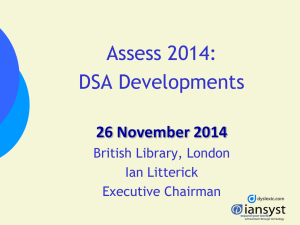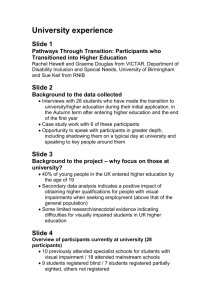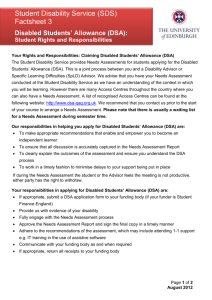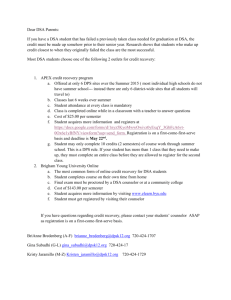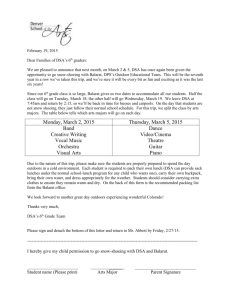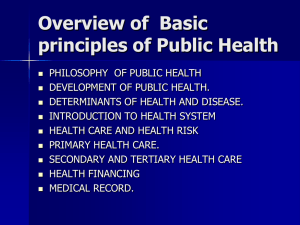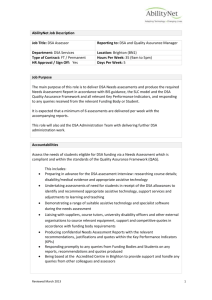- University of Oxford
advertisement
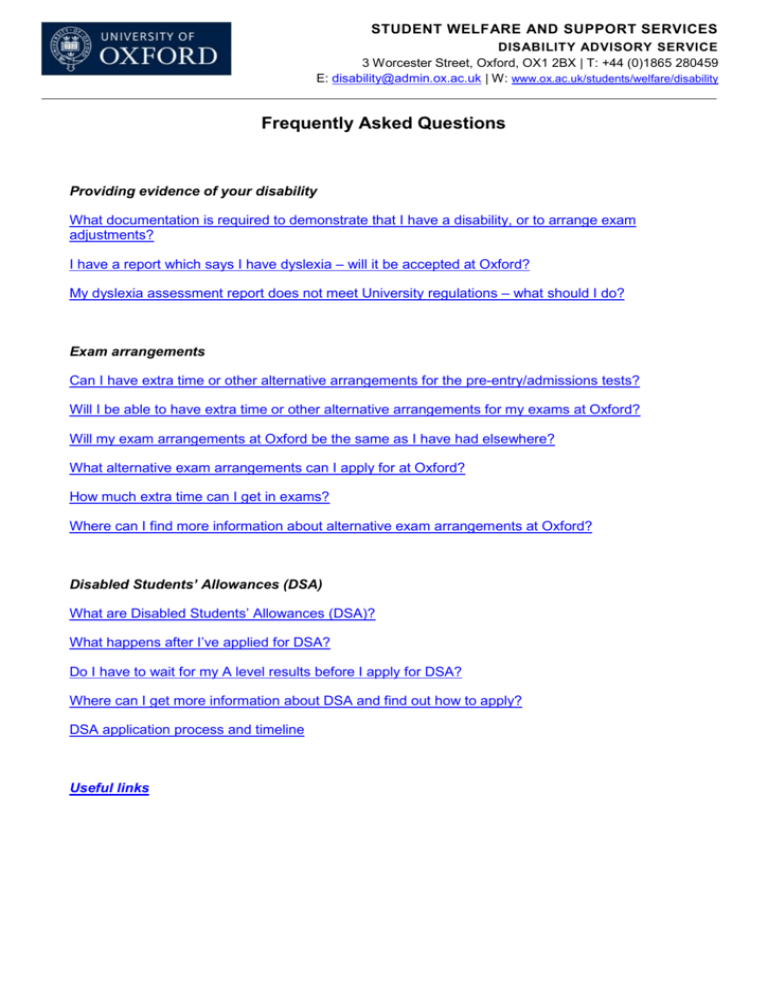
STUDENT WELFARE AND SUPPORT SERVICES DISABILITY ADVISORY SERVICE 3 Worcester Street, Oxford, OX1 2BX | T: +44 (0)1865 280459 E: disability@admin.ox.ac.uk | W: www.ox.ac.uk/students/welfare/disability Frequently Asked Questions Providing evidence of your disability What documentation is required to demonstrate that I have a disability, or to arrange exam adjustments? I have a report which says I have dyslexia – will it be accepted at Oxford? My dyslexia assessment report does not meet University regulations – what should I do? Exam arrangements Can I have extra time or other alternative arrangements for the pre-entry/admissions tests? Will I be able to have extra time or other alternative arrangements for my exams at Oxford? Will my exam arrangements at Oxford be the same as I have had elsewhere? What alternative exam arrangements can I apply for at Oxford? How much extra time can I get in exams? Where can I find more information about alternative exam arrangements at Oxford? Disabled Students’ Allowances (DSA) What are Disabled Students’ Allowances (DSA)? What happens after I’ve applied for DSA? Do I have to wait for my A level results before I apply for DSA? Where can I get more information about DSA and find out how to apply? DSA application process and timeline Useful links Providing evidence of your disability What documentation is required to demonstrate that I have a disability, or to arrange exam adjustments? Specific learning difficulties (SpLD) such as dyslexia or dyspraxia A diagnostic assessment report, from an educational psychologist or specialist teacher with a valid practising certificate, which was conducted: after your sixteenth birthday within three years (for undergraduates) or five years (for postgraduates) of the start of your course at Oxford on an individual basis with tests designed for use with adults The University’s guidelines for SpLD diagnostic assessment reports (1) provide more detail about these requirements. If you are unsure we are happy to advise. Other types of disability (e.g. mental health conditions, physical, sensory or long term health conditions) A letter from a doctor or appropriately qualified medical professional is required and must specify: what your condition or impairment is (including the formal diagnosis) how long you have had it or when you were diagnosed how the disability impacts on your daily activities (this could include your studies and performance in exams) Autism Spectrum Disorders A statement of Special Educational Needs (SEN) or an Education Health and Care Plan issued by a Local Authority. Alternatively, you can provide a letter from a doctor or appropriately qualified medical professional which confirms the formal diagnosis, when you were diagnosed, and the impact on your daily activities (this could include your studies and performance in exams). Back to top I have a report which says I have dyslexia – will it be accepted at Oxford? Yes, but only if it meets the University’s criteria (1) – see the text above about the basic requirements for documentation. If you need a new report we advise you to seek one as soon as possible. We are always happy to advise on reports and how to arrange a new assessment. Back to top 2 My dyslexia assessment report does not meet University regulations – what should I do? We have established relationships with assessors in Oxford and London and might be able to offer you an appointment with them. Alternatively, you can find a suitably qualified local assessor. You might do this through the PATOSS Tutor/Assessor Index (2). or the British Psychological Society directory, for example. Please ask the assessor if they are registered to undertake assessments to support Disabled Students Allowance applications and take with you the Oxford guidelines (1) so the assessor knows what the University needs. You must pay for this assessment yourself but if you keep evidence of payment, the University will reimburse you up to £400 when you enrol at Oxford. Students continuing directly from undergraduate to graduate study at Oxford will not normally require a new diagnostic assessment and should contact the Disability Advisory Service for guidance on how to proceed. Back to top 3 Exam arrangements Can I have extra time or other alternative arrangements for the pre-entry/admissions tests? Yes, you should make arrangements with the test centre for extra time or any other exam adjustments that you normally have due to a disability or specific learning difficulty (SpLD). Back to top Will I be able to have extra time or other alternative arrangements for my exams at Oxford? Yes, if you provide the University with up-to-date, suitable evidence. Back to top Will my exam arrangements at Oxford be the same as I have had elsewhere? Not necessarily. The University of Oxford has its own regulations for exams, but we will take into account previous arrangements. The University’s Proctors (3) make the final decision on whether to allow the adjustments requested. Back to top What alternative exam arrangements can I apply for at Oxford? We will consider all requests for alternative exam arrangements, but they most commonly involve extra writing time and/or rest breaks, and the use of a computer or other software and equipment. All requests are considered on an individual basis and need to be justified with supporting evidence demonstrating need (e.g. a SpLD assessment report or a medical letter). We can help you to get the necessary supporting documents, and will make a recommendation based on which your college will submit the application to the Proctors’ Office. Back to top How much extra time can I get in exams? Each request is considered on an individual basis to ensure that the arrangements are fair. Many students with SpLDs receive 25% extra time (15 minutes per hour). Back to top Where can I find more information about alternative exam arrangements at Oxford? Check the University’s web page on alternative arrangements (5), or talk to the Disability Advisory Service. Back to top 4 Disabled Students’ Allowances (DSA) What are Disabled Students’ Allowances (DSA)? Disabled Students’ Allowances (DSA) are non-means tested grants awarded to you to help pay for additional costs you incur while at university as a direct result of your disability, long term health condition, or specific learning difficulty (SpLD) such as dyslexia. DSAs fund disability-related study support, including human support, items of specialist equipment and software, and travel costs. Back to top What happens after I’ve applied for DSA? You will be asked to attend a ‘study needs assessment’ to find out what study aids and support you need. The University of Oxford has its own accredited Assessment Centre (6) and we can book you an appointment here, or advise you on how to find an approved centre more local to you via www.dsa-qag.org.uk. Back to top Do I have to wait for my A level results before I apply for DSA? No, you should apply as soon as you have been made an offer (conditional or unconditional) as it can take up to 14 weeks to process applications and for support to be fully implemented. Please refer to our DSA timeline for further information. Back to top Where can I get more information about DSA and find out how to apply? Before you apply you will need to gather evidence to show you are eligible for DSA. See our section on what documentation is required to demonstrate that you have a disability for more information. DSAs are provided by your funding body and you can visit the relevant website below for more detailed information and to download an application form: Student Finance England Overview of DSAs and application forms Quick Guide to Disabled Students’ Allowances (DSAs) ‘Bridging the Gap’ – Comprehensive Guide to Disabled Students’ Allowances (DSAs) DSA fact sheet Student Finance Wales Student Awards Agency for Scotland (SAAS) Student Finance Northern Ireland (NI) Republic of Ireland NHS Student Bursaries 5 Research Councils UK: Contact the Disability Advisory Service who will establish your eligibility, arrange a study needs assessment, ask the research council to approve funding, and facilitate the implementation of any recommended study aids and strategies. International students: The University has a policy of funding disability-related study support for non-UK students who are not eligible for DSA. In order to assess the study support requirements of non-UK students, a study needs assessment (6) will be undertaken which mirrors the experience of UK students. The resulting assessment report will guide the University in making reasonable adjustments and facilitating any support required. Back to top 6 DSA application process and timeline • Contact the Disability Advisory Service and complete a registration form Download a Disabled Students' Allowance (DSA) application form Send completed DSA application to your funding body with supporting evidence of your disability Step 1 • • Step 2 • Funding body assesses your DSA application and issues an 'eligibility letter' confirming you can attend a Study Needs Assessment • Contact the Oxford University Assessment Centre (www.ouac.co.uk) to arrange a Study Needs Assessment, or find an accredited centre more local to you via www.dsa-qag.org.uk • After your assessment the centre will send a report to you for your records, and to the funding body for approval • Funding body issues a 'DSA entitlement letter' confirming the support they have agreed to pay for and how to go about arranging support Step 6 • 2 weeks • Contact equipment supplier to arrange delivery (if relveant) - we can assist with ordering equipment on request We will also help implement any approved human support (e.g. SpLD tutors) or recommendations for institutional adjustments 2-3 weeks Step 3 2-3 weeks Step 4 2-3 weeks Step 5 1-2 weeks Please note that the above process applies to students funded by Student Finance England and Student Finance Wales. More information about the DSA application process for the other funding bodies is available on the relevant websites. 7 Back to top Useful links 1. Guidelines for SpLD diagnostic assessment reports: http://www.ox.ac.uk/sites/files/oxford/field/field_document/Guidance%20on%20SpLD%20Diagno stic%20Assessments.pdf 2. The Professional Association of Teachers of Students with Specific Learning Difficulties (PATOSS) Tutor/Assessor Index: https://www.patossdyslexia.org/SupportAdvice/TutorAssessorIndex/TutorAssessorIndex/ The British Psychological Society Directory of Chartered Psychologists: http://www.bps.org.uk/bpslegacy/dcp 3. Proctors’ Office guidance on exam arrangements: http://www.admin.ox.ac.uk/proctors/examinations/ 4. Mock exams: http://www.ox.ac.uk/students/academic/exams/mocks 5. Alternative arrangements: http://www.ox.ac.uk/students/academic/exams/arrangements 6. Oxford University Assessment Centre: http://www.ouac.co.uk/ 7. DirectGov DSA overview (SFE): https://www.gov.uk/disabled-students-allowancesdsas/overview 8. Quick guide to DSA (SFE): http://slc-apps.co.uk/Quick-Start-Finance-Guide/disabled-studentsallowances.html 9. Bridging the Gap (comprehensive guide to DSA for SFE): http://www.sfengland.slc.co.uk/media/664653/sfe_dsa_guide_1415_d.pdf 10. Student Finance Wales DSA: http://www.studentfinancewales.co.uk/new-students/201415what-financial-support-is-available/extra-support/disabled-students%E2%80%99allowances.aspx#.VNnQoy6A-Zc 11. Student Awards Agency for Scotland (SAAS) DSA: http://www.saas.gov.uk/how_to_apply/dsa.htm 12. Student Finance Northern Ireland (NI) DSA: http://www.studentfinanceni.co.uk/portal/page?_pageid=54,1268397&_dad=portal&_schema=P ORTAL 13. Republic of Ireland DSA: http://www.studentfinance.ie/mp7575/fund-for-students-withdisabilities/index.html 14. NHS Student Bursaries DSA: http://www.nhsbsa.nhs.uk/Students/Documents/Students/DSA1_v4.2_Application_and_Guidanc e_for_Disabled_Students_Allowance.pdf 8
